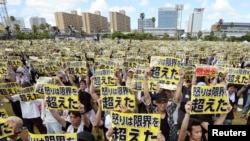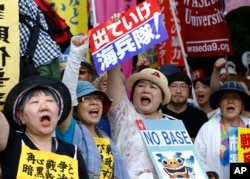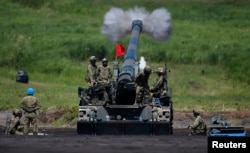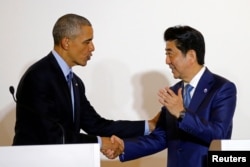Recent anti-American protests in Japan reflect growing disapproval of Prime Minister Shinzo Abe’s assertive military policies, which opponents want to make a key issue in July’s parliamentary election.
Over the weekend more than 65,000 protested in Okinawa, where public anger against the concentration U.S. military bases on the island has intensified after a former U.S. Marine was arrested in connection with the death of a local woman in May, and a U.S. Navy sailor pleaded guilty to raping a Japanese tourist in March.
Also on Sunday about 7,000 Japanese demonstrated in front of the parliament building in Tokyo.
In addition to calling for the removal or reduction of the U.S. military presence in their country, the protesters also voiced opposition to Abe’s bolstering Japan’s security alliance with the U.S. and his efforts to revise the country’s pacifist constitution to increase the power and scope of the Japanese military.
“You have to say that the public mood in Okinawa has gone from angry to extremely angry and the general mood in Japan is one that is marked by concern that Abe is somehow going to get Japan dragged into war, somehow, somewhere at Washington’s behest,” said Jeff Kingston, director of Asian Studies at Temple University in Tokyo.
Election debate
Last year Abe’s supporters in the Japanese bicameral legislature known as the National Diet passed controversial security legislation that revised 10 existing laws to give the military more latitude to defend Japan's people and interests and to participate in collective self-defense and defend allies like the United States.
Opponents argue that the bills violated Article 9 of the country’s postwar constitution that renounces the use of offensive force to wage war or settle international disputes, and entangles Japan in international conflicts.
At a debate among leaders of Japan’s major parties in Tokyo Tuesday Katsuya Okada, leader of the opposition "Democratic Party" vowed to fight any attempts to change the constitution saying, “Last year's debate over security, and over the revision of Article 9 of the constitution, this is something we just cannot accept.”
Opponents argue that Abe’s military policies will not make the country safer.
“I think that they feel that his more militarized foreign-policy is counterproductive, and it is actually leaving Japan somewhat isolated in Asia because none of the other Asian states want to join up to a regional security framework that is predicated on militarized confrontation with China,” said Kingston.
Prime Minister Shinzo Abe and his supporters argue Japan needs a stronger and less restricted military to deal with a more assertive China and a nuclear North Korea.
At the debate Abe seemed to minimize the power of a simple majority in parliament to change the constitution saying, “lawmakers can by majority get a law passed, but that's not so for the constitution.”
Amending the constitution requires the agreement of two-thirds of both houses of the Diet and Abe suggested that the question should be put to a national referendum.
Public opinion polls show that more than half of Japan's population is opposed to both the recent security legislation and to altering the country’s pacifist constitution.
Abe’s coalition still leading
It remains to be seen if Japan’s opposition parties can translate public discontent into increased political support. Recent polls show the ruling Liberal Democratic Party comfortably ahead of its main rival the Democratic Party.
Critics say despite broad opposition to Abe’s security policies and frustration that his “Abenomics” conservative fiscal policies have so far failed to revitalized the economy, the opposition has been unable to offer persuasive alternatives.
China and other countries in Asia that suffered under Japanese occupation during World War II have raised concerns that Tokyo could again become an aggressive military power if it continues to loosen its constitutional constraints.
U.S. President Barack Obama reaffirmed his strong support for the close military alliance with Japan during his visit to Hiroshima in May. But Republican presidential candidate Donald Trump earlier criticized Japan for not sufficiently reimbursing the U.S. for the cost of stationing 50,000 American troops to defend their country. And if elected president he said he would withdraw military personnel if a better deal could not be reached, and he would allow Japan to acquire nuclear weapons to defend itself.













